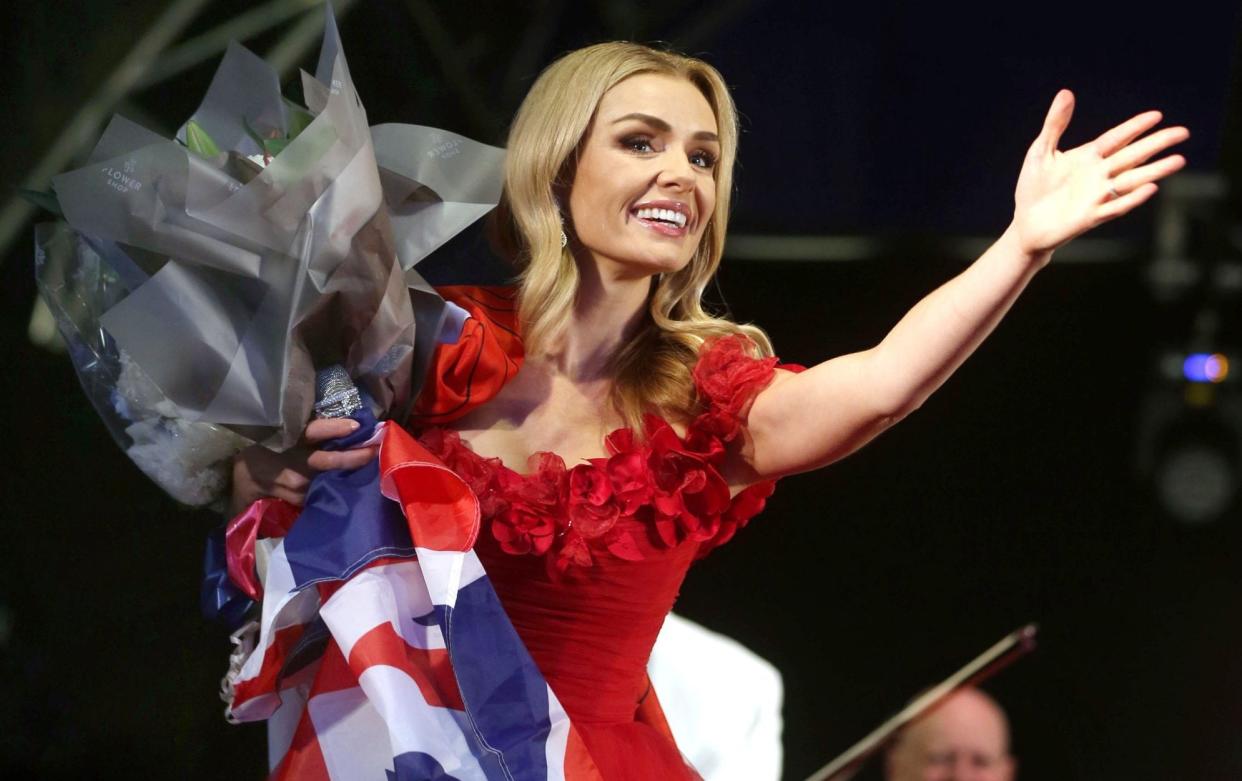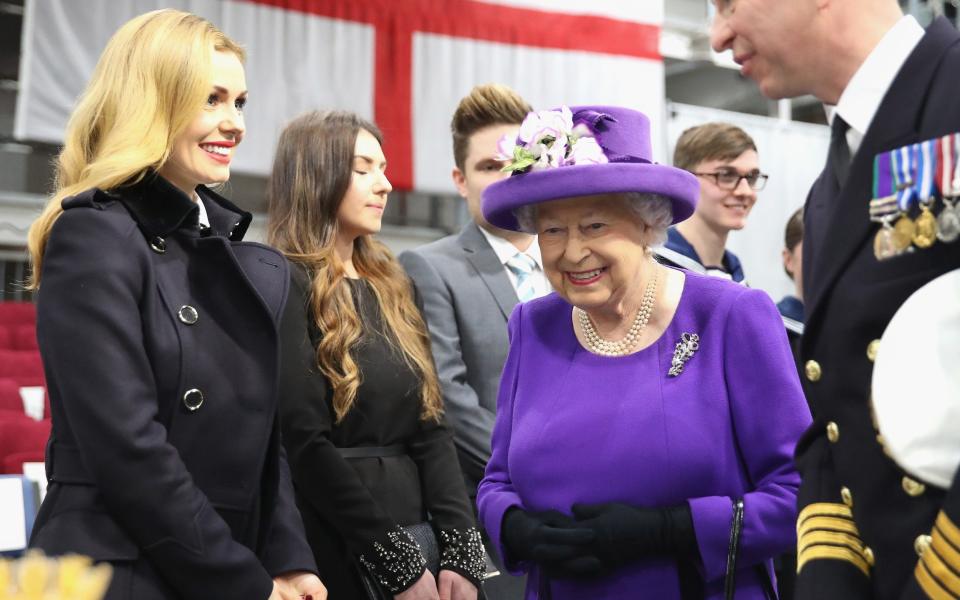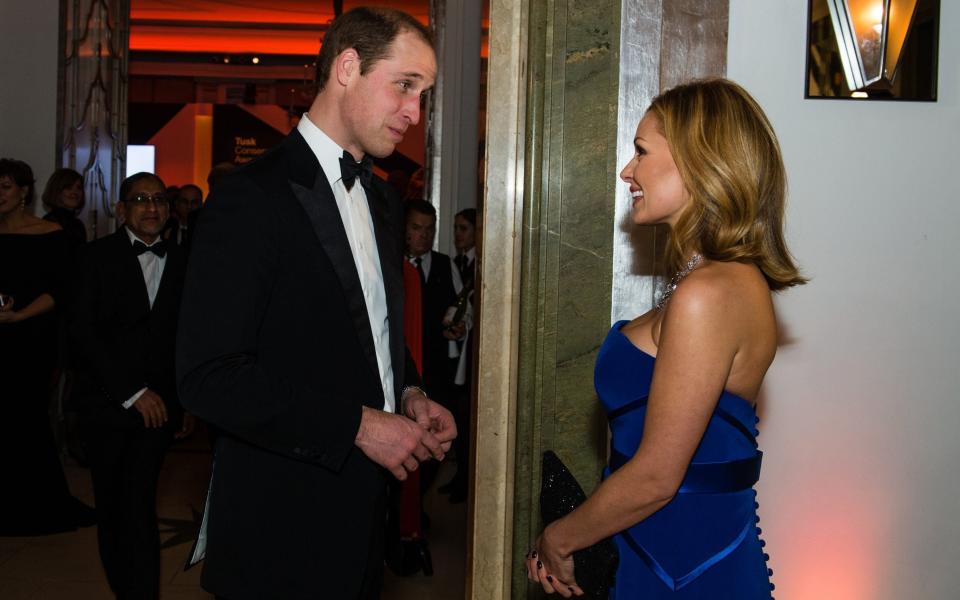Katherine Jenkins on singing God Save the King: ‘It was very emotional’

Katherine Jenkins was driving past Windsor on Thursday afternoon after news of Queen Elizabeth II's ill-health had become public. The Welsh mezzo-soprano glanced towards Windsor Castle and saw an “amazing” rainbow arching over the Berkshire town. Despite the sad news that followed, she drew succour from the symbolism. “In the same way that Her Majesty made us feel that she knew what to say to make us feel comforted in the darkest times, I saw that rainbow and it felt like such a sign, honestly,” Jenkins says.
The 42-year-old heard the news of the late Queen’s death at home later that evening. She had sung for the monarch on many occasions including at her Diamond Jubilee, the Derby, during celebrations to mark Queen Elizabeth II’s 90th birthday and at the recent Platinum Jubilee. Jenkins had also performed for her in what she describes as “more private settings”. However, the singer barely had time to digest the news.
On Friday morning – in a move that had been planned on Thursday evening – she travelled to a rural church on the Wiston Estate in West Sussex to record a specially rewritten version of the hymn Here Is Love Vast as the Ocean for last night’s Songs of Praise in honour of the late Queen. It was during rehearsals for this that she received an unexpected call from the BBC. They asked if she’d like to be the first person to sing God Save the King on the radio, to be broadcast on Radio 4’s The World At One in a couple of hours’ time.
“We sort of stopped what we were doing,” Jenkins says. “I realised this was an enormous honour. So we took a moment’s silence and said a little prayer.” Luckily, her team had a version of the National Anthem’s backing track with them, as it’s a song she sings so regularly. She rehearsed it and recorded it “in one go”. The process was, she says, “very emotional, especially as I have so many wonderful memories of singing it for Her Majesty over the years and realising that that won’t happen again”.
Of course, this song was different. On a purely practical level, she had to sing “King” instead of “Queen, “his” instead of “her”, “he” instead of “she”. It’s a song Jenkins has sung many times over many decades, so just how easy was it to sing the new version without inadvertently slipping into the old?
“I ran it through in my head before I went to sing it so that I would think it, because naturally you would sing ‘her’,” she explains. “You know, this is a song I have sung hundreds and hundreds of times, so it did require concentration.” There was another change in the lyrics too. The penultimate line of the second (and last) verse, in Jenkins’s version at least, was changed from, “To sing with heart and voice” to “With heart and voice to sing” so that it rhymed with the last line, “God Save the King.”
Ah yes, the verses. The National Anthem originally had six verses, with lyrics that referenced scattering our enemies and saving the monarch from the assassin’s blow. Not only did these not get an airing in Jenkins’s version, but they appear to have been cancelled altogether.
A new version of the song that has been put on the Royal Family’s website in the past few days states rather formally that “the words of the National Anthem are as follows…” before it lists a two-verse version of God Save the King. Enemies, it seems, are no longer to be scattered. (The website does, however, state, “Additional verses have been added down the years, but these are rarely used.”) Jenkins says she isn’t sure what the official state of play is regarding the lost verses. But she adds that throughout her entire career she has never once sung those words.

The singer says she’ll feel the late Queen’s loss greatly. She recalls first singing for her when she was in her early twenties, and her admiration just grew and grew. This had the knock-on effect of making her more jittery every time she sang for her. “The more I met her, the more I learned about her work ethic, her faith, and her dedication to the country and the Commonwealth. I think that made it even harder to sing because I’d feel even more nervous because I admired her so much.”
Over the years, they met and chatted many times. Can she give me an insight into the late Queen’s character, beyond what we already know? “She always felt very maternal,” says Jenkins. “And I think she had a really good sense of understanding how people might be feeling. She read situations really well, and I think that’s sort of a gift in itself. She also had a great sense of humour in a really quick way. I definitely remember those one-liners. You’d come away and think, ‘That was brilliant.’”
Oh go on. Tell me one of the late Queen’s one-liners. Jenkins pauses. “I don’t think it’s time to… I feel I’d rather focus on her in a broader way than sort of individual things,” she says. Those regal quips will have to wait for another time.
Singing the National Anthem to radio listeners on Friday was just the latest milestone in a storied career. Between 2004 and 2008, six out of seven of Jenkins’s albums reached number one in the UK classical charts, while in 2017 Classic FM announced that she was the best-selling classical artist of the past 25 years in the UK, ahead of even Luciano Pavarotti. When it comes to classical music in this country, and beyond, she matters. So I wonder what she thinks of the BBC’s decision to cancel the Last Night of the Proms on Saturday night as a mark of respect to the Queen. Is there not an argument that it could have been a celebratory, bonding moment?

“I’d rather not answer that one,” she says diplomatically [we’re speaking on the morning of the aborted Prom]. “I think they made a decision that probably they felt was the respectful thing to do at the time,” she adds.
And what of our new monarch? When it comes to King Charles, she says she has “no doubt” he’ll rise to the occasion.
“I’ve seen him at work. We do some shared charity things, like the British Horse Foundation, and I respect his work in environmental and conservation areas. What I’ve witnessed is that he’s a man who really cares. And he has a big heart. And I think bringing that into this role means that he will be a wonderful king.”
Jenkins may have been behind one of the first public performances of the new National Anthem, but the coming week will see countless millions more stand and sing as this sad, surreal period of seismic change and solemn ceremony continues. How does she think the country is feeling right now?
“I think people are feeling incredibly emotional,” she says. “And I think they’re also feeling very proud of the Queen and her life’s work. I think people just want to honour that in the most respectful way.”
It will undoubtedly be a stormy week ahead when it comes to the country’s emotions. But without rain – as Jenkins herself would no doubt acknowledge – there can be no rainbows.

 Yahoo News
Yahoo News 
